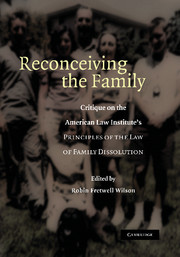 Reconceiving the Family
Reconceiving the Family Published online by Cambridge University Press: 25 January 2010
This chapter offers a vision of negotiation and compromise in domestic relations litigation, and especially in child support matters, that is drawn from my own experience as the Chief Justice of the Michigan Supreme Court from 2001–2004. In that capacity, I shared with our governor the administrative oversight responsibility for Michigan's child support enforcement system.
I became Michigan's Chief Justice in January 2001. My own initial introduction to child support law was sudden and a bit frightening. The first day on my new job brought word from the state budget director that the Judiciary should expect significant budget cuts because the federal government had penalized Michigan $39 million for failing to comply with a federal mandate to create a statewide computerized child support enforcement system. Michigan, a state whose population barely tops 10 million, currently has more than 800,000 open cases involving children who are entitled to receive support from noncustodial parents pursuant to orders issued in divorce and paternity cases. The penalties for not complying with the federal mandate would have increased exponentially in subsequent fiscal years. Although we had many excuses and explanations, we had exhausted the federal government's patience and so faced crippling economic penalties if we did not create a functioning statewide system almost from scratch in just two years, by September 30, 2003.
We did it, and the federal certification authorities later dubbed our effort the “Michigan Miracle” because no other state had been able to create a certification-worthy system in so little time.
To save this book to your Kindle, first ensure no-reply@cambridge.org is added to your Approved Personal Document E-mail List under your Personal Document Settings on the Manage Your Content and Devices page of your Amazon account. Then enter the ‘name’ part of your Kindle email address below. Find out more about saving to your Kindle.
Note you can select to save to either the @free.kindle.com or @kindle.com variations. ‘@free.kindle.com’ emails are free but can only be saved to your device when it is connected to wi-fi. ‘@kindle.com’ emails can be delivered even when you are not connected to wi-fi, but note that service fees apply.
Find out more about the Kindle Personal Document Service.
To save content items to your account, please confirm that you agree to abide by our usage policies. If this is the first time you use this feature, you will be asked to authorise Cambridge Core to connect with your account. Find out more about saving content to Dropbox.
To save content items to your account, please confirm that you agree to abide by our usage policies. If this is the first time you use this feature, you will be asked to authorise Cambridge Core to connect with your account. Find out more about saving content to Google Drive.